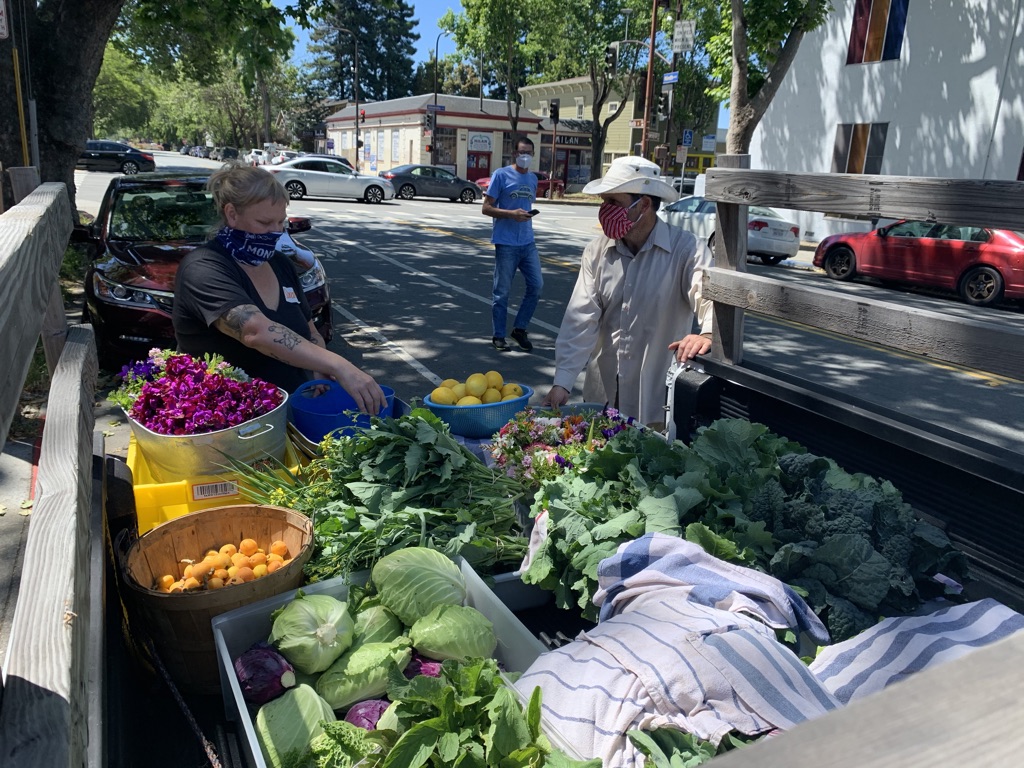By Evan Hazelett, BFN Research and Advocacy Manager
December 8, 2020
The COVID-19 pandemic has thrown into sharp relief the realities of poverty, food insecurity, housing instability, and racial injustice in the United States. Since May, an astounding 8 million Americans have slipped into poverty.
Black, Latinx, indigenous, and immigrant households have been hit particularly hard—Black people, for instance, are dying at twice the rate of whites and are experiencing significantly higher food insecurity. Black, Latinx, Asian, and foreign-born workers have all faced much higher job loss, particularly Black and Latina women and those in low-income jobs. Further, Black renters have reported difficulty coming up with next month’s rent at a rate nearly twice that of white renters. Given these hardships, it comes as no surprise that Berkeley Food Network saw its client base increase more than three times since March in a city where one in five residents was already food insecure.
The pandemic has also laid bare the labor exploitation and racial injustices of our industrial food system. U.S. farmworkers, 75% of whom are undocumented, are in constant fear of deportation—yet they have been conveniently labeled “essential” by the federal government during the pandemic. Already facing long-standing and systemic abuse, low pay, and unsafe living and working conditions, farmworkers now face some of the highest rates of Covid-19.
Some owners of farms and food processing plants have refused to implement the COVID-19 agricultural workplace safety features recommended by the CDC. Back in March, Alfie Oakes, CEO of Oakes Farm in Naples, Florida, posted on Facebook that “the people that have propagated this [COVID-19] hoax should get the death penalty.” Factory workers, such as meatpackers, have also been disproportionately affected by the virus, with similar neglect by employers. Just a couple weeks ago, managers at Tyson were sued for betting on how many workers would contract the virus.
Meanwhile, billions of dollars in federal government COVID-19 farm relief have been directed primarily to large, mostly white industrial farmers, while black and family-owned farms have struggled to access relief—just one more inequity in a century-long project of discrimination by the USDA in farm loans, precipitating a legacy of black farm loss and dispossession.
For decades, flexibility has been traded in for efficiency across industrial food chains and trade networks, another vulnerability exposed by the pandemic. When the pandemic hit, farmers did not adjust output—farmers supplying specific supply chains serving institutional food service providers, such as schools, hospitals, and hotels, have had to dump, smash, or plow under millions of pounds of fresh goods as those providers shut down. As a result, grocery prices are rising even as hunger skyrockets. To build greater resilience into our food systems, making them less vulnerable to supply chain shocks—resulting from emergencies like pandemics, climate-related events, natural phenomena like fires, and low crop yields—the UN’s Food and Agriculture Organization suggests bolstering local food systems. This would involve establishing more comprehensive policies to respond to crises, promoting greater cooperation across scales, cities, and sectors, promoting racial justice in expanded local and regional food production, and bulking up social protection programs and food distribution.
To this end, BFN is ramping up its support of regional food production into the new year through an expanded purchasing program to direct money to sustainable and regenerative farmers, particularly farmers of color and farmworkers-turned-farmers. For instance, we are purchasing produce from the Agriculture and Land-Based Training Association (ALBA) in Salinas Valley, which trains low-income farmworkers and aspiring farmers on a 100-acre training facility. We made our first purchase in October and have spent nearly $4,000 a month on beautiful, organic vegetables for our on-site pantry and distribution partnerships. By directing money toward our values, we can support farmers of color while simultaneously accessing super fresh, nutritious produce for the communities we serve.
In the coming months and years, BFN will be expanding these efforts to secure a greater diversity and quantity of fresh produce for our clients, while at the same time contributing to growing a robust, resilient, just food system. We are also looking to increase our purchasing of organic, sustainable dry goods to provide the healthiest possible options for our community. These purchasing initiatives begin to address just a small slice of the broader puzzle of inequities, but they’re a start. We believe it’s possible to simultaneously serve food-insecure residents while nudging the food system in the right direction.
